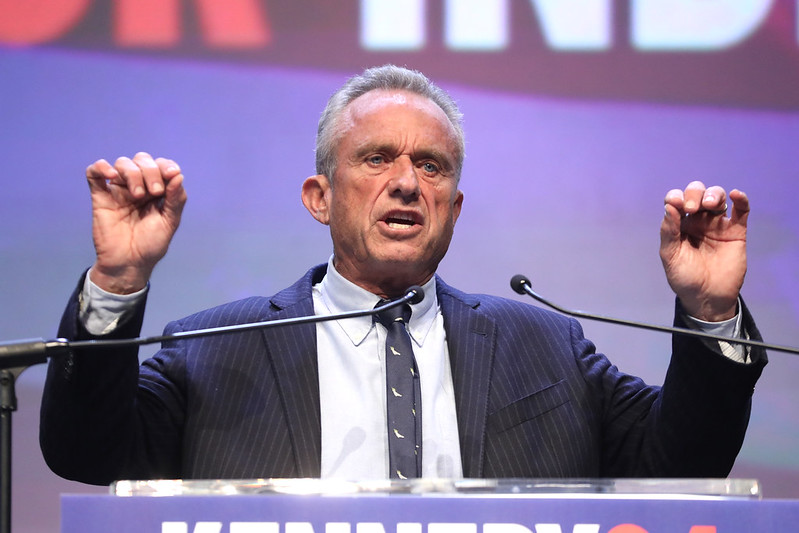Top Stories
Robert F. Kennedy Jr. Scraps mRNA Vaccine Programs, Sparking Controversy

U.S. Secretary of Health and Human Services, Robert F. Kennedy Jr., announced on August 5, 2025, a significant reduction in funding for mRNA vaccine development. This decision, which involves the termination of 22 projects worth nearly $500 million, has sparked intense debate over the safety and efficacy of these vaccines, particularly in the context of ongoing respiratory disease threats.
The announcement indicates a shift toward investing in “safer, broader vaccine strategies” that, according to Kennedy, are more effective against evolving viruses. This decision has raised concerns among public health experts who argue that mRNA vaccines have played a crucial role in combating the COVID-19 pandemic and other infectious diseases.
Kennedy’s office stated, “We reviewed the science, listened to the experts, and acted.” He indicated that the data showed mRNA vaccines “fail to protect effectively against upper respiratory infections like COVID and flu.” However, many medical professionals challenge this characterization, asserting that mRNA vaccines by Pfizer and Moderna have provided significant immunity against severe illness and death from COVID-19.
Public Health Experts Respond
Critics have voiced their concerns regarding Kennedy’s claims. Michael Osterholm, a prominent epidemiologist and director of the Center for Infectious Disease Research and Policy at the University of Minnesota, emphasized in an interview, “The profile for mRNA vaccines is as safe as any we have.” He noted that while immunity may be reduced against some variants, the vaccines still effectively prevent serious illness and save lives.
Furthermore, a 2023 study published in the International Journal of Molecular Sciences highlighted the historical success of vaccinations in managing infectious diseases. It pointed out that vaccines prevent an estimated 2-3 million deaths annually from diseases such as pertussis and measles. The authors elaborated on the advantages of mRNA vaccines, including their safety, efficacy, and rapid production capabilities, which were crucial during the pandemic.
In contrast, Kennedy’s statements have been perceived by some as part of a broader anti-vaccine agenda that undermines public health efforts. His past has been marked by controversial positions on vaccines, including claims linking vaccines to autism, which have been widely debunked by scientific research.
Implications for Public Health
The implications of Kennedy’s decision extend beyond financial cuts. Experts warn that it may further erode public confidence in vaccines at a time when respiratory viruses, including COVID-19, are on the rise. Data from the Centers for Disease Control and Prevention (CDC) indicates an uptick in COVID cases, as highlighted by various reports in early August 2025.
Kennedy’s approach has raised alarms among health professionals who fear that misinformation could lead to decreased vaccination rates. Steve Inskeep from NPR discussed the potential consequences of Kennedy’s actions with Osterholm, who remarked, “What RFK has done is not only withdrawn these new programs to support mRNA technology research, but he’s also created more doubt in the population.”
The decision to halt mRNA vaccine funding reflects a significant shift in federal vaccine development priorities. The Biomedical Advanced Research and Development Authority (BARDA) will now focus on different vaccine platforms, including whole-virus vaccines, which Kennedy claims have stronger safety records. This transition raises questions about the long-term strategy of the U.S. health administration in addressing current and future pandemics.
As the debate continues, public health experts urge individuals to stay informed and consider vaccination as an essential defense against serious illness. With the current landscape of respiratory diseases, the importance of effective vaccines cannot be overstated.
In conclusion, as Robert F. Kennedy Jr. pushes for a new direction in vaccine development, the medical community remains vigilant, advocating for evidence-based practices that prioritize public health and safety. Vaccination remains a critical tool in fighting infectious diseases, and health officials are calling for continued support and confidence in these lifesaving interventions.
-

 Health3 months ago
Health3 months agoNeurologist Warns Excessive Use of Supplements Can Harm Brain
-

 Health3 months ago
Health3 months agoFiona Phillips’ Husband Shares Heartfelt Update on Her Alzheimer’s Journey
-

 Science2 months ago
Science2 months agoBrian Cox Addresses Claims of Alien Probe in 3I/ATLAS Discovery
-

 Science2 months ago
Science2 months agoNASA Investigates Unusual Comet 3I/ATLAS; New Findings Emerge
-

 Science1 month ago
Science1 month agoScientists Examine 3I/ATLAS: Alien Artifact or Cosmic Oddity?
-

 Entertainment2 months ago
Entertainment2 months agoLewis Cope Addresses Accusations of Dance Training Advantage
-

 Entertainment5 months ago
Entertainment5 months agoKerry Katona Discusses Future Baby Plans and Brian McFadden’s Wedding
-

 Science1 month ago
Science1 month agoNASA Investigates Speedy Object 3I/ATLAS, Sparking Speculation
-

 Entertainment4 months ago
Entertainment4 months agoEmmerdale Faces Tension as Dylan and April’s Lives Hang in the Balance
-

 World3 months ago
World3 months agoCole Palmer’s Cryptic Message to Kobbie Mainoo Following Loan Talks
-

 Science1 month ago
Science1 month agoNASA Scientists Explore Origins of 3I/ATLAS, a Fast-Moving Visitor
-

 Entertainment4 months ago
Entertainment4 months agoMajor Cast Changes at Coronation Street: Exits and Returns in 2025









